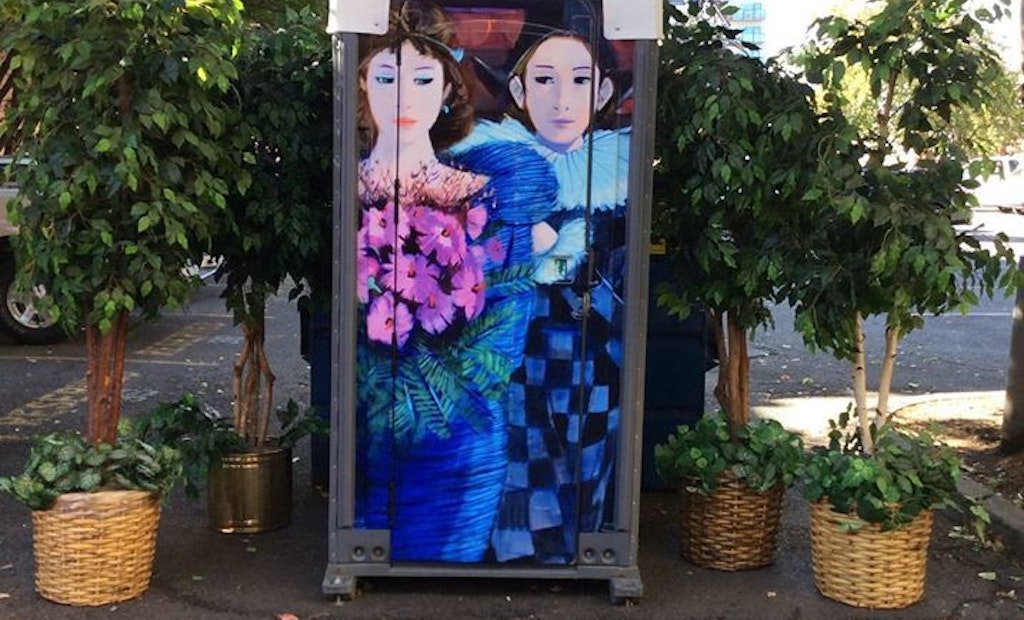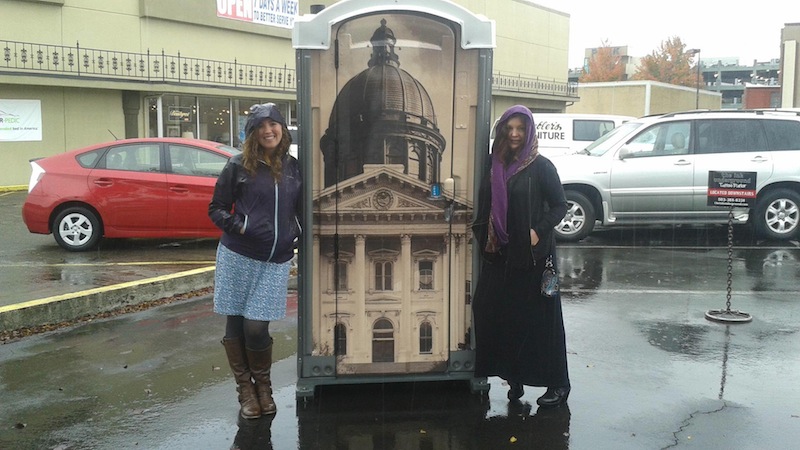
Interested in Portable Sanitation?
Get Portable Sanitation articles, news and videos right in your inbox! Sign up now.
Portable Sanitation + Get AlertsA creative plan to bring art-wrapped portable restrooms to Salem, Oregon, is proving to be an extremely useful and pleasant alternative to what residents were seeing ... large amounts of human waste in the city's downtown core.
The "Arta Potties" – conceived by a group of five women from the art, business, homeless services and faith communities of Salem – fill a void created by a lack of city bathrooms, a growing homeless population, and the increasing unwillingness of businesses to allow houseless or unsheltered residents to enter their restrooms. Business owners have a right to be concerned; bathrooms are often the first place targeted for graffiti and other types of damage.
While vandalism is an ever-present possibility, it hasn't happened to the Arta Potties. In fact, members of the homeless community are among those keeping a protective eye on the Arta Potties, as these facilities are already reducing the numbers of police arrests for public urination and defecation.
The founders of the project, affectionately known in Salem as the Arta Potties Five, recognize that criminals do sometimes strike portable restrooms. But they believe this effort, which aims to respect all people who may need relief, may have a sort of immunity through its unique approach. The attractive art and photo wrapped portable bathrooms prevent 15-30 gallons of human waste from being deposited in Salem's alleys, bushes and business alcoves.
One of the Arta Potties Five, Verena Wessel with Northwest Human Services, has been working with homeless adults and youth for 15 years. She says even homeless people with serious mental health issues are grateful for the new project. "I can only imagine that people prefer to go into a bathroom than go into an alleyway or defecate on themselves; I've seen both.”
Another member, Senior Pastor Janet Parker with the First Congregational United Church of Christ, laments the lack of city facilities that led to the need for Arta Potties. "Because there are no public toilets in this area, and there are some that get locked overnight, people had no choice but to defecate and urinate in public."
Parker echoes the remarks of Wessel, stating that the lack of facilities and increasing public exposure to human waste is a health hazard that impacts not only houseless residents but the public as a whole. She also cites the city's practice of running people out of homeless camps and inevitably driving large numbers into the city's downtown. "I think it's absolutely critical; I think it is a human rights issue, it's a moral issue and a civic issue, it's a health issue."
Arta Potties Five member Pamela Phillips Watson, who serves with the Salem Homeless Coalition, is a steadfast supporter of local residents in need. Watson has been deeply engaged with unsheltered residents who are continually routed, chased, swept or "purged" from the homeless camps, many of which are in West Salem. She does her best to help people understand that a large percentage of houseless residents suffer from untreated mental health issues.
Rebecca Courtney, also a member of the Arta Potties Five, has been leading campaigns to help Salem's downtown for well over a decade. She is the group's art connection, and her employer, Roger Yost, has voiced his willingness to provide incredible paintings to base the art wraps on.
Courtney says, "Art is part of the humanities, it is a way to communicate, and we wanted to create something that would be really beautiful for the city to be proud of, and believe it or not porta potties can be beautiful."
Courtney has been tracking down the images for the Arta Potties, which are wrapped in vinyl. She contracted the services from Adam Navarro of Clean Slate Beautification, and then went through a challenging process of determining what type of images work, and how to take those images to full size wraps large enough to cover a portable restroom.

Interestingly, the images for the restrooms range from historic paintings, to photos of Salem's past. The second decorated restroom was installed on Front Street in the parking lot of Kuebler Furniture. The image used was provided by a local antique dealer and expert on Salem's downtown, Martin Goebel with Art and Antiques Plus.
Of course locating a portable sanitation company willing to go out on a limb with a new idea wasn't easy. Courtney believes she scored big when she tracked down Ace Chemical Toilets, a company whose office manager, Ione Darras, quickly became a treasured friend and ally of the Arta Potties Five. The company has absolutely helped make this happen, Courtney and the other members of the group stress.
The city didn’t immediately jump on board to offer up space for the restrooms, citing budget limitations. So the women hope other people will offer up private space to accommodate more restrooms. The group plans to get at least seven Arta Potties installed, to help the area homeless and anyone else who needs a facility while in the area. Arta Potties are completely funded by donations, included discounted service from Ace Chemical Toilets.
Have you contributed to a project to better serve your community, maybe by donating services or rentals? Tell us your story! Comment below or email kim.peterson@colepublishing.com.







